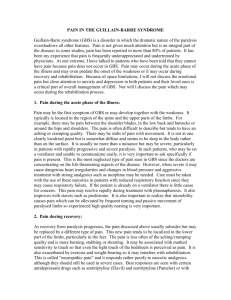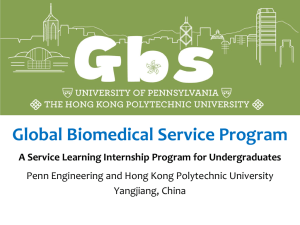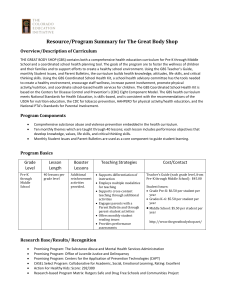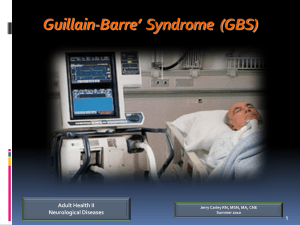Writing Assignment 3 - University of Pittsburgh
advertisement
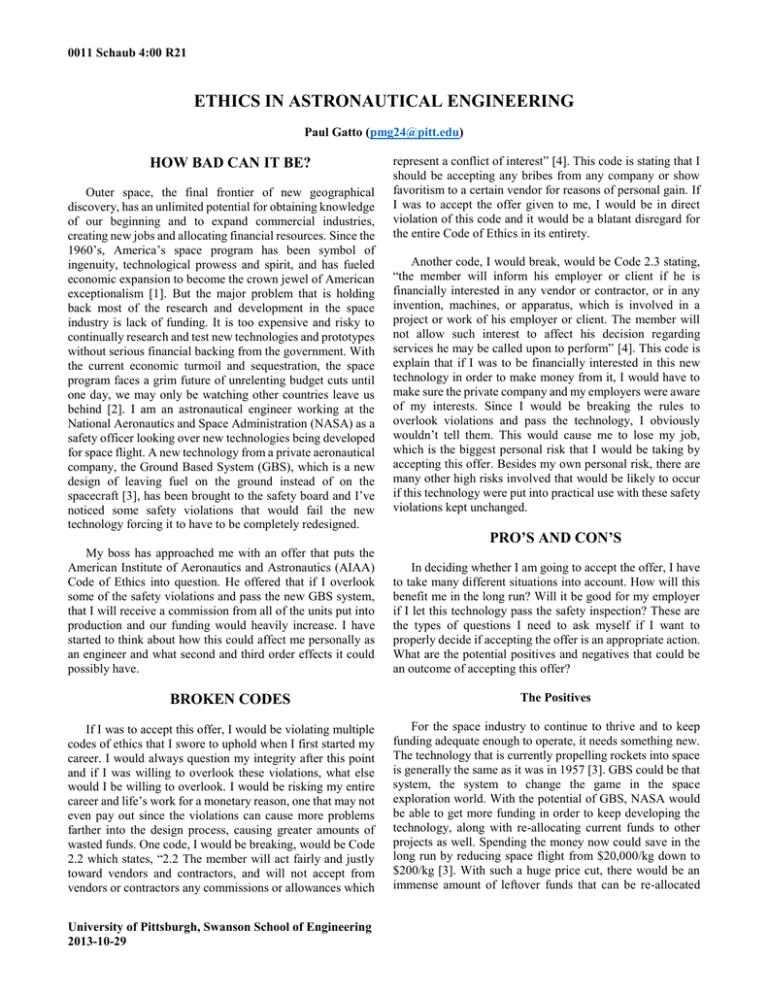
0011 Schaub 4:00 R21 ETHICS IN ASTRONAUTICAL ENGINEERING Paul Gatto (pmg24@pitt.edu) HOW BAD CAN IT BE? Outer space, the final frontier of new geographical discovery, has an unlimited potential for obtaining knowledge of our beginning and to expand commercial industries, creating new jobs and allocating financial resources. Since the 1960’s, America’s space program has been symbol of ingenuity, technological prowess and spirit, and has fueled economic expansion to become the crown jewel of American exceptionalism [1]. But the major problem that is holding back most of the research and development in the space industry is lack of funding. It is too expensive and risky to continually research and test new technologies and prototypes without serious financial backing from the government. With the current economic turmoil and sequestration, the space program faces a grim future of unrelenting budget cuts until one day, we may only be watching other countries leave us behind [2]. I am an astronautical engineer working at the National Aeronautics and Space Administration (NASA) as a safety officer looking over new technologies being developed for space flight. A new technology from a private aeronautical company, the Ground Based System (GBS), which is a new design of leaving fuel on the ground instead of on the spacecraft [3], has been brought to the safety board and I’ve noticed some safety violations that would fail the new technology forcing it to have to be completely redesigned. My boss has approached me with an offer that puts the American Institute of Aeronautics and Astronautics (AIAA) Code of Ethics into question. He offered that if I overlook some of the safety violations and pass the new GBS system, that I will receive a commission from all of the units put into production and our funding would heavily increase. I have started to think about how this could affect me personally as an engineer and what second and third order effects it could possibly have. BROKEN CODES If I was to accept this offer, I would be violating multiple codes of ethics that I swore to uphold when I first started my career. I would always question my integrity after this point and if I was willing to overlook these violations, what else would I be willing to overlook. I would be risking my entire career and life’s work for a monetary reason, one that may not even pay out since the violations can cause more problems farther into the design process, causing greater amounts of wasted funds. One code, I would be breaking, would be Code 2.2 which states, “2.2 The member will act fairly and justly toward vendors and contractors, and will not accept from vendors or contractors any commissions or allowances which University of Pittsburgh, Swanson School of Engineering 2013-10-29 represent a conflict of interest” [4]. This code is stating that I should be accepting any bribes from any company or show favoritism to a certain vendor for reasons of personal gain. If I was to accept the offer given to me, I would be in direct violation of this code and it would be a blatant disregard for the entire Code of Ethics in its entirety. Another code, I would break, would be Code 2.3 stating, “the member will inform his employer or client if he is financially interested in any vendor or contractor, or in any invention, machines, or apparatus, which is involved in a project or work of his employer or client. The member will not allow such interest to affect his decision regarding services he may be called upon to perform” [4]. This code is explain that if I was to be financially interested in this new technology in order to make money from it, I would have to make sure the private company and my employers were aware of my interests. Since I would be breaking the rules to overlook violations and pass the technology, I obviously wouldn’t tell them. This would cause me to lose my job, which is the biggest personal risk that I would be taking by accepting this offer. Besides my own personal risk, there are many other high risks involved that would be likely to occur if this technology were put into practical use with these safety violations kept unchanged. PRO’S AND CON’S In deciding whether I am going to accept the offer, I have to take many different situations into account. How will this benefit me in the long run? Will it be good for my employer if I let this technology pass the safety inspection? These are the types of questions I need to ask myself if I want to properly decide if accepting the offer is an appropriate action. What are the potential positives and negatives that could be an outcome of accepting this offer? The Positives For the space industry to continue to thrive and to keep funding adequate enough to operate, it needs something new. The technology that is currently propelling rockets into space is generally the same as it was in 1957 [3]. GBS could be that system, the system to change the game in the space exploration world. With the potential of GBS, NASA would be able to get more funding in order to keep developing the technology, along with re-allocating current funds to other projects as well. Spending the money now could save in the long run by reducing space flight from $20,000/kg down to $200/kg [3]. With such a huge price cut, there would be an immense amount of leftover funds that can be re-allocated Paul Gatto into actual research of space, flying further into space than we have before, exploring extra-terrestrial bodies that could give us astounding knowledge like whether there life is life outside out planet. Currently the project to explore the frozen oceans of Jupiter’s moon Europa for signs of extra-terrestrial life, which is considered to be the scientific community’s top priority, has been cut allocate funding [5]. The GBS system can be incorporated into other propulsion concepts currently in development such as magnetic levitation and propulsion, and space elevators, using magnets and counter weights to tether payloads up to space [3]. Also, with increase funding, there is potential for continued expansion of the space industry. The space industry is a major contributor of revenue for the US economy. The space industry contributes $31 billion in revenues in California alone, which incorporates 71,000 jobs whose wages support another 300,000 jobs, totaling to about $19 billion in California wages. Every part of the commercial sector where the space industry operates take a share of the major growth in high wage industries such as space craft, rocket launching, and satellite services [6]. Money is the greatest issues at this time, and NASA knows it. William Gerstenmaier, NASA’s human-spaceflight chief, has said that the US is at a “tipping point” in the space industry and is about to tip in the wrong direction. Future budget cuts on space spending will be inevitable due to the already weaken economy [6]. GBS may be what the space industry needs in order to get that push back in the right direction. Putting Humans Back on the Space Map With the continuation of GBS development, the preferred method of space exploration would change back to human exploration rather than the current trend of robotic exploration. Although human exploration can cost up to 100 times more than robotics [5], the investment has proven to be worth it. Humans have the ability to accomplish a great amount more than what just a robot can. One advantage is greater mobility and in-the-moment exploration opportunities. Humans also can make on-the-spot decisions and prioritize mission objectives and exploration activities. This could include a wider range of locations and more efficient, intelligent collection samples [8] Ian Crawford, from the Department of Earth and Planetary Sciences at Birbeck College London, explains, “Compare the 35.7 km traversed in three days by the Apollo 17 astronauts in December 1972 with the almost identical distance (34.4 km) traversed by the Mars Exploration Rover Opportunity in eight years” [9]. He continues on to explain about the increased efficiency of sample collecting and return capacity by stating, “Compare the 382kg of samples returned by Apollo with the 0.32 kg from the Russian robotic sample return missions Lunas 16, 20, and 24, and the zero kg returned so far by any robotic mission to Mars” [9]. These comparisons give sizable credit that human space exploration can far greater exceed productivity of robotics. With GBS into development stages, human space exploration would be just as inexpensive as robotics. The Negatives If I were to accept the offer, and pass this new technology, I would also be running many risks just with the technology alone. There are many things that could go wrong if the GBS would get to the testing phases and the violations having not been fixed. The biggest risk is loss of human life. The entire space industry is risky and dangerous, but it’s the risk we take to further our knowledge of space and sciences. Despite the risk and costs, the space program has been a crucial element in technological advancement and commerce to the United States and the world. The Astronauts represent the best of the best in the spirit of mankind and they willing accept the risk of their lives to broaden humanities knowledge and frontiers [10]. Human space travel is immensely dangerous already. 22 of the 439 people that have flown in space from the US have died, which is a mortality rate of 4.1%, which puts space flight almost at the top of the most dangerous jobs list. These figures don’t include the approximately 70 people from ground crews who have also died [5]. How would I feel if I knew that my overlooks caused the unnecessary death of someone? It may be an extreme scenario but it is a potential possibility and cannot be ignored. Another negative to accepting the offer would be that if GBS ended up being a huge failure, I could add negative publicity to NASA’s already shaky reputation, something it cannot afford. After the Columbia shuttle disintegrated over Texas in 2003, killing all 7 astronauts while trying to re-enter the atmosphere, NASA’s reputation floundered and the benefits of exploring space were put on the proverbial chopping block. During this negative time for NASA, the short term effects actually helped find problems in the system and allocate funds to more appropriate projects. It also helped educate the public on arising innovations coming from the program [11]. KEEPING IT ETHICAL If I were to refuse the offer and fail the Ground Based System, I would be sending the technology back to the drawing boards. All of the resources already spent on development will have been wasted. Without this potential new technology, NASA will basically still be in the same situation as we were before. We won’t have a new, big upand-coming technology, we would not be able to use the potential GBS has to allocate more funding, and we wouldn’t have the potential probability of stumbling on new technologies for other industries just from researching about ours. An example of these happenstance discoveries would be Nitinol, a metal that can with stand intense twisting and bending, which now has a secondary use in orthodontic Page 2 Paul Gatto braces. NASA’s research and development of space technologies has brought forth countless unexpected benefits, some of which being prominent industries today such as alternative energy, industrial manufacturing and machine aided medicines [11]. Without GBS and the potential funding that could come with it, more and more budget cuts will proceed in the near future causing research and development to cease, and could even cause employment cuts. NASA is highly vulnerable to sequestration and budget cutting due to such an immense amount of funds needed for proper research and testing [7]. Although refusing the offer and failing this new technology would waste all of the money already put into the project, it would inevitably save the even more money that could be wasted if it was put into the project then the projects fails in a later developmental stage. The money saved from GBS failing at an early stage can be allocated into other projects that have more potential for success. IT’S JUST NOT WORTH IT I have decided that I would not take the offer and fail the new technology, Ground Breaking Systems (GBS), for safety violations. The risk is too great and although there are many positive reasons and innovations that could come from GBS moving to a further stage in development, in the end they are all potential and the negatives seem too dangerous. I would rather see a safer, more thought out version of GBS come back and spend the extra funds than to send a faulty, unsafe version of this new technology and see it fail, wasting even more money and potentially majorly putting lives at risk. No monetary value can be put on a human life. In this situation, although very tempting and seeming to have limitless positives, I would stick to the AIAA Code of Ethics, and refuse an offer made by a private company to receive commission on the project. The Code of Ethics has been put into place for a reason, and should be adhered too, to the best of everyone in the industry’s integrity and ability. (2209) development.” Issues in Science and Technology. (Online Article). Vol 29.1. pp. 57 [4] “AIAA Code of Ethics.” (2013). The American Institute of Aeronautics and Astronautics. (Online Article). www.aiaa.org/secondary.aspx?id=4324 [5] P. Pawlick. (2013). “Point: Human Space Flight is a Pointless Waste of Money.” Point of View: U.S. Space Program. (Online Article). P2-2. P1 [6] “Cutting Space Programs Could Make A Nosediving Economy Even Weaker” Space & Missile Defense Report. (Online Article). Vol. 32. No. 16 [7] F. Morring Jr. (2012). “Tipping Point.” Aviation Week & Space Technology. (Print Article). Vol. 174, no 47. pp. 24 [8] I. Crawford. (2010). “Astrobiological benefits of human space exploration.” Astrobiology. (Online Report). http://wwwliebertpub,com/publication.aspx?pub_id=99 [9] I. Crawford. (2012). “Dispelling the myth of robotic efficiency.” Astronomy & Geophysics. (Online Article). DOI: 10.1111/j.1468-4004.2012.53222.x. pp. 2.22-2.26 [10] E. Badertscher. (2013). “Counterpoint: The Vital Importance of Space Exploration.” Points of View: U.S. Space Program. (Online Article). P6-6. 1p. [11] M. Issitt. (2013). “Counterpoint: We All Benefit from Space Exploration.” Points of View: U.S. Space Program. (Online Article). P3-3. 1p. ACKNOWLEDGEMENTS I would like to thank Matt Zora for helping me in my decision of my scenario and for formatting guidance. I would also like to that Steve Anderjack for the many indepth discussions on codes of ethics and the basis of what I have written about, and Chris Bowman for proofreading, grammar and formatting help. REFERENCES [1] M. Albrecht. (2011). “America’s space program is crashing; Final shuttle launch of bloated, disorganized agency.” The Washington Times. (Print Article). ISSN 07328494, 2011.07.07, sec B. pp. 3 [2] A. Harman. (2012). “Cutting space programs lets others overtake us.” The Washington Times. (Print Letter). DOI: 10.1111/J.1468-4004.2012.53222.x. pp. 2.22-2.26 [3] J. Coopersmith. (2012). “Affordable access to space: rockets are the 20th-century technology. A government effort to develop new technologies could open the door to a vast array of new opportunities for space exploration and Page 3
